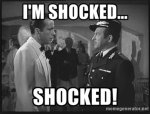Brian Flores has alleged that Stephen Ross, owner of the Miami Dolphins, offered the then Dolphins head coach $100,000 per loss in a tanking scheme for a better draft position. (He’s also accusing NFL teams of hiring discrimination, arguably a more important and serious allegation, but also out of the main focus of this blog: I leave that to legal scholars.) Former Brown’s coach, Hue Jackson, has also come forward alleging that the Browns paid him to lose in a similar pay-to-tank scheme.
 On one hand, the media and sports pundits sound a lot like Captain Renault. Tanking? What? How could that be? Not in the NFL! On the other hand, owners paying coaches to intentionally lose does seem somehow worse than just Suck for Luck.
On one hand, the media and sports pundits sound a lot like Captain Renault. Tanking? What? How could that be? Not in the NFL! On the other hand, owners paying coaches to intentionally lose does seem somehow worse than just Suck for Luck.
So, what, if anything, is wrong with tanking?
The basic argument is that sport is a competition. It is, as the late Robert Simon described it, “a mutual quest for excellence.” Winning may not be everything, but the attempt to win, to play hard, to give one’s maximum effort seems to be essential. To lose on purpose, to throw the game, undermines the very point and essence of the activity.
Secondly, sport is open-ended. The outcome is to be determined by the play of the game. For a team to commit itself to lose means the activity is no longer a contest. It becomes something akin to a scripted performance, rather than sporting event. As Simon has argued elsewhere, this cheats everyone involved.
But it is also not quite that simple. Why, after all, are the teams (allegedly) tanking? Why did the Colts purportedly Suck for Luck? It was to get Andrew Luck, a QB with the potential to carry the Colts forward to many winning seasons after they parted ways with Peyton Manning. Isn’t this, then, attempting to win over the long haul? That is, by losing now, a team has the potential to sign players through the draft who will hopefully allow them to win more later. Maybe, then, this Tanking-As-Delayed-Gratification is ultimately compatible with the ideal of sport as a mutual quest for excellence. After all, the concern is not excellence in this one play, this one quarter. We strive for overall excellence. If the scope of ‘overall’ extends beyond any one game to multiple seasons, it might seem rational and justified to lose now so that you have better chance of being excellent over a longer term in the future.
I think there are two main objections to this argument.
First, it doesn’t address the core argument that intentionally losing a given contest is incompatible with it being a contest. The seasons are made up of individual contests. These individual contests need to be valid contests for the season to be valid. And the same reasoning applies across seasons. Therefore, if tanking undermines the contest itself, then this undermines the losing now for winning over the long term.
Second, it is false and deceptive. The team presents itself as engaging in a contest, when they know they are not. It would be more honest to just forfeit. It is an affront to the pride and integrity of the players that take the field.
So what about the pay-to-tank scheme? It certainly looks worse than your average tanking scenario. It just tastes and smells yucky. But that’s not a moral argument. If tanking were morally appropriate, I wouldn’t have any issue with paying for it. But since I’ve argued above that it is not morally appropriate, it is also wrong to pay for it. Paying for it also adds more formality and intentionality. A team might not be good and might not put all its effort forward in each contest. It might look like it is tanking, but then again maybe they just suck. But put a payment schedule on the losing and that removes any question.







